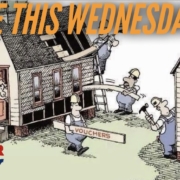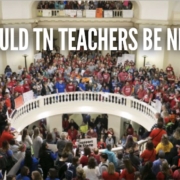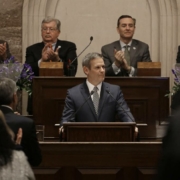Posts
Carol Swain Insanity
/in Education, Health Care, TOPICS, VIDEOS /by Justin KanewThis past Sunday morning, The Holler’s Kanew joined FOX 17’s “Nashville in Focus” political panel along with the infamous Carol Swain. Swain is known for spewing top-notch GOP propaganda, and her talking points on this panel were no different. From downplaying the COVID19 pandemic to claiming that teachers shouldn’t be paid as much to teach remotely, Swain is in rare form on this panel.
Swain on Masks:
?WATCH: “Sorry I can’t just sit here silently and listen to these talking points.”
On @FOXNashville the Holler’s @Kanew stops @carolmswain from peddling deadly mask misinfo.
80% of ?? supports?mandates. Even Trump now calls masks “Patriotic”. @Scott_Couch @HarrietvWallace pic.twitter.com/LEyFbwCu7d
— The Tennessee Holler (@TheTNHoller) July 27, 2020
Swain on schools re-opening during COVID19:
?WATCH: “Republicans are so excited to get our kids back in public schools… they should think about that next time they kill amendments to fund them.”
Holler’s @Kanew claps back at @carolmswain‘s lies that “the left” is ruining our underfunded schools. @FOXNashville pic.twitter.com/4qyi7vS2kp
— The Tennessee Holler (@TheTNHoller) July 27, 2020
Watch the full panel here.
OPINION: “HEADS UP! THIS IS IT.” #Vouchers #Wednesday
/in Education, State, TOPICS /by StaffNashville school board member Amy Frogge talks about a key vote on Governor Bill Lee’s voucher plan — a vote scheduled for Wednesday, March 27th.
First seen on the TN Ed Report. Follow @TNEdReport for more.
HEADS UP, everyone! THIS IS IT. Vouchers will be up for a key vote this coming Wednesday, March 27th, at 8 am in the full House Education Committee, and this is our best chance to stop them in Tennessee. IT IS SUPER IMPORTANT THAT WE ACT NOW.

Here’s information on the bill: HB 939/SB 795 would create a new form of vouchers in Tennessee called Education Savings Accounts (ESAs). ESAs have been described as “vouchers on steroids.”
This proposed legislation is targeted not toward “children trapped in failing schools,” but toward wealthier families, with virtually no regulation or public accountability. Vouchers would be available in any district containing at least three schools in the bottom 10% of schools in the state, but vouchers would be made available to ALL students in that district, including those enrolled in high-performing schools and private schools.
Families making up to around $100,000 per year would be eligible for the voucher, and private schools would not be required to accept the voucher as payment in full. This means that more affluent families with children already enrolled in private schools could use the voucher to help offset their current payments for private school.
Vouchers are corrupt. https://t.co/8j5Osr9AdP
— Amy Frogge (@AmyFrogge) March 25, 2019
It will also allow students to cross county lines with their vouchers, which could wreak havoc on many rural school districts.
Local school districts will have to pay for the bulk of these vouchers. (For example, in Davidson County, the state would pay only about $3,600 toward the cost of the voucher, while Davidson County would be required to pay about $8,100 per voucher.)
On top of this, the state would withhold a 6% management fee for the voucher program. The governor has claimed that a limited amount of funding will be available to school districts to help offset the cost of the vouchers for three years, but this money could be revoked at any time- and worse, vouchers will create ongoing recurring costs that school districts will be unable to cover for an indefinite period of time.
Once the door to vouchers has been opened, it cannot be shut. Under this legislation, vouchers would become an entitlement for upper middle class private school parents and homeschool parents.
HERE’S HOW YOU CAN HELP:
1. We need as many people as possible to attend the hearing. It will be in House Hearing Room 1 of the Cordell Hull Building.
2. Contact members of the committee NOW, and encourage your friends to do so. (Obviously, constituents of these members will make the greatest impact.)
Mark White, Chair 615-741-4415
[email protected]
Kirk Haston, Vice Chair 615-741-0750
[email protected]
Debra Moody 615-741-3774 [email protected]
Charlie Baum 615-741-6849 [email protected]
David Byrd 615-741-2190
[email protected]
Scott Cepicky 615-741-3005
[email protected]
Mark Cochran 615-741-1725
[email protected]
Jim Coley 615-741-8201
[email protected]
John DeBerry, Jr. 615-741-2239 [email protected]
Vincent Dixie 615-741-1997 [email protected]
Jason Hodges 615-741-2043
[email protected]
Chris Hurt 615-741-2134
[email protected]
Tom Leatherwood 615-741-7084 [email protected]
Bill Dunn 615-741-1721 [email protected]
Harold Love, Jr. 615-741-3831
[email protected]
Antonio Parkinson 615-741-4575
[email protected]
John Ragan 615-741-4400
[email protected]
Iris Rudder 615-741-8695
[email protected]
Jerry Sexton 615-741-2534
[email protected]
Kevin Vaughn 615-741-1866
[email protected]
Terri Lynn Weaver 615-741-2192
[email protected]
Ryan Williams 615-741-1875
[email protected]
John Mark Windle 716-741-1260
[email protected]
OPINION: Tennessee Teachers Could Be Next To Strike
/in Education, State, TOPICS, Unions /by StaffThis post from organizer/journalist Chris Brooks was first seen on the TN Ed Report. Follow @TheAndySpears for his take on politics and policy and subscribe to the TN ED REPORT HERE.
Chris Brooks is a former organizer with the Tennessee Education Association and currently works as an organizer and staff writer for Labor Notes.
Tennessee teachers have taken a pummeling over the years.
They’re grossly underpaid and their professional autonomy has been stripped away. Their students are over-tested and their schools underfunded.
But what has been the collective response?
To lie low.
Keep their heads down.
This is especially true of the leadership in their union, the Tennessee Education Association. They’ve pursued a strategy of “it’s better to be at the table than on the menu.”
This strategy emphasizes access over confrontation. They hope that small incremental change will be possible through a combination of lobbying and writing checks to political campaigns. And since the union isn’t being adversarial, isn’t pushing too hard or too fast, they hope they won’t be a target for political retribution.
Those hopes have been misplaced.
Across the state, conditions in schools have only gotten worse. Tennessee consistently ranks near the bottom of the country in per-pupil spending. Experienced and qualified teachers are leaving the profession in droves.
Now, newly elected Governor Bill Lee is taking direct aim at public education. He just announced a state budget that doubles funding for charter schools and is pushing lawmakers to approve $25 million for vouchers. Governor Lee’s disastrous privatization agenda will further drain resources from schools that are already struggling to get by.
The lesson here is that we can’t incrementally lobby our way out of the hole we are in.
Lying low doesn’t work, but there is another way.
All across the country, teachers are supercharging the routine of lobbying and elections with a far more powerful tool: they are going out on strike.
Teachers in West Virginia, Arizona, Los Angeles, Chicago, and Kentucky have used collective action to transform the political landscape. They’ve decimated charter and voucher legislation, stopped further spending cuts, and pushed policies that actually benefit student outcomes: lower class sizes, more nurses and counselors, an end to toxic testing, and paying teachers adequately so school systems can retain them for more than a few years.
There is clear tangible evidence that strikes work. A new report from the Center on Budget and Policy Priorities found that “protests by teachers and others last year helped lead to substantial increases in school funding in Arizona, North Carolina, Oklahoma, and West Virginia.”
It didn’t matter that striking is illegal in many of these states or that the state government is dominated by anti-union Republicans.
When teachers found the courage to strike they found out that the community—and often even their boss—had their back
With so many school districts struggling to make ends meet, striking teachers found that their demands for increased state funding had the support of their local administrators. Because superintendents closed their schools during the nine-day West Virginia strike, teachers didn’t lose pay and the strike rolled on.
Parents know that issues like class size and funding matter. It’s common sense. Would you rather your child be in a classroom with twenty other students or forty? Do you want your child to be taught by a capable, qualified professional or to be endlessly drilled in preparation for a high-stakes test?
Unsurprisingly, teachers everywhere have received an outpouring of support from parents and community members when they hit the picket lines.
Teachers living with anemic unions and deteriorating conditions in their schools have created their own Facebook groups to communicate with each other and coordinate actions across school sites. Examples include West Virginia Public Employees United, KY 120 United, and Arizona Educators United.
Now there is TN Teachers United.
“This group is for any public school educator who is tired of their students’ needs being put last and is tired of their voices being ignored,” said Lauren Sorensen, a second grade teacher at Halls Elementary School in Knox County and a longtime leader in her local union. “If you are ready to organize and act, then join us.”
The group was formed following a video call organized by Labor Notes between Tennessee teacher activists and two of the rank-and-file organizers of the statewide walkouts in Arizona and West Virginia (see video below).
Tennessee teachers face the same issues and challenges as teachers in West Virginia and Arizona—and they are just as resourceful.
They just have to ask themselves: are they going to keep lying low or are they going to start fighting back?
Chris Brooks is a former organizer with the Tennessee Education Association and currently works as an organizer and staff writer for Labor Notes.
TN ED REPORT: “100% FOR CHARTERS, 2.5% FOR TEACHERS” #StateOfTheState
/in Education, State, TOPICS /by StaffAndy Spears owns the public policy consulting firm Spears Strategy which provides policy and advocacy consulting to school systems, non-profits, and parent groups. Spears holds a Ph.D. in Public Administration with an emphasis in education policy. Over the past 15 years, he has worked in public policy roles in state and local government in Kentucky and Tennessee. Follow @TheAndySpears for his take on politics and policy and subscribe to the TN ED REPORT HERE.
—–
Tonight, Governor Bill Lee outlined his proposed budget for 2019-2020. Lee’s budget doubles the fund for charter school facilities to $12 million. This amounts to a benefit of $342 per student (there are roughly 35,000 Tennessee students in charter schools).
Meanwhile, he announced a meager improvement to teacher salaries of around 2% – $71 million. This amounts to $71 per student.
So, charter schools — which serve only 3.5% of the state’s students — will see a 100% increase in available facility funding from the state while teachers will see only a 2% increase in pay.
If the two investments were equal and funded at the rate granted to charter schools, there would be a $342 million investment in teacher salaries. That’s roughly a 10% raise. A raise that’s desperately needed as Tennessee leads the nation in percentage of teachers with little to no classroom experience. We also have one of the largest teacher wage gaps in the Southeast.
As one Nashville teacher pointed out, Nashville – and the entire state — have a failed business plan:
I’m starting a business and looking for workers. The work is intense, so the workers should be highly skilled. Experience preferred. Starting salary is 40k with the opportunity to get all the way to 65k after 25 years of staying in the same position. See how dumb that sounds?
Now, those are numbers for Nashville. Some teachers around the state have to teach for 10 years before they even hit $40,000. Still, the point is clear: The value proposition for teachers in our state is not very good. Unfortunately, Governor Lee’s first budget is not doing much to change that. It’s the status quo. A nominal increase that will likely not entirely make it into teacher paychecks.
Tennessee’s numbers when it comes to both investment in schools and educational attainment are disappointing. Continuing along the same path means we’ll keep getting the same results.
The bottom line: Money matters.





